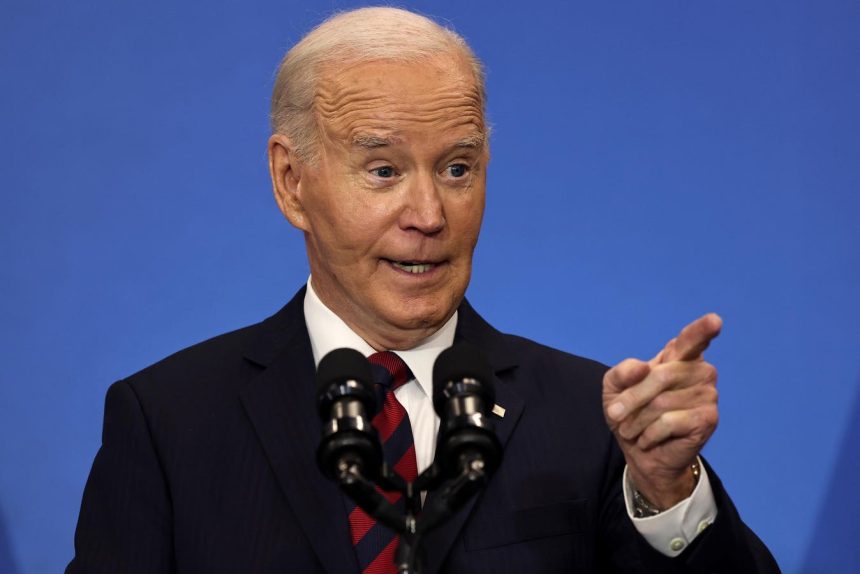President Joe Biden has publicly endorsed a ban on stock trading by members of Congress, marking a significant shift in his stance on the long-debated issue. In an upcoming interview with non-profit news organization A More Perfect Union, Biden stated unequivocally that no member of Congress should be able to profit from the stock market while holding office. He questioned how representatives could justify leveraging their positions for personal financial gain, suggesting it erodes public trust and creates the appearance of impropriety. This declaration represents a departure from Biden’s previous position of leaving the matter to Congress to decide. His strong words signal a potential push for legislative action to address the concerns surrounding congressional stock trading.
The President’s endorsement adds momentum to ongoing efforts to reform the practice. A bipartisan bill, the Bipartisan Restoring Faith in Government Act, was introduced last year to prohibit members of Congress and their families from owning or trading individual stocks. The proposed legislation, which stalled before reaching a vote, would have required members to divest their holdings or place them in blind trusts within 90 days of the act taking effect. Similar measures have been proposed in the past by prominent figures like Senators Elizabeth Warren and Steve Daines, and former House Speaker Nancy Pelosi, but have failed to gain sufficient bipartisan support. Biden’s endorsement could provide the necessary impetus to revive these efforts and finally bring the issue to a vote.
The controversy surrounding congressional stock trading stems from concerns about potential conflicts of interest and insider trading. Members of Congress have access to confidential information that can influence market prices, raising questions about whether they are using this information for personal gain. Several high-profile cases have fueled public skepticism and calls for reform. In 2020, Senators Richard Burr and Kelly Loeffler faced scrutiny over large stock sales made before the COVID-19 pandemic sent markets plummeting, though both denied using insider information. Similarly, former House Speaker Nancy Pelosi’s husband, Paul Pelosi, attracted attention for substantial profits from Alphabet options trades before a House panel considered antitrust actions against the company. While no wrongdoing was proven in these cases, they highlight the potential for abuse and the need for stronger regulations.
Current regulations governing congressional stock trading are outlined in the Stop Trading on Congressional Knowledge (STOCK) Act of 2012. This law requires members of Congress to disclose trades exceeding $1,000 within 45 days, and prohibits trading based on non-public information. However, critics argue that the STOCK Act is insufficient to prevent potential conflicts of interest. Concerns have been raised about inconsistent disclosure practices, with some members failing to file reports on time or at all. The relatively low penalties for violations, starting at $200, have also been criticized as a weak deterrent. Furthermore, the lack of public records regarding violations and fines makes it difficult to assess the effectiveness of enforcement.
The debate over congressional stock trading is not new. A 2011 “60 Minutes” investigation raised questions about potential insider trading by members of Congress before the 2008 financial crisis. More recently, a 2022 New York Times analysis found that at least 97 members of Congress had traded stocks or assets that intersected with their legislative work or committee assignments. These revelations have intensified calls for reform and contributed to growing public distrust in Congress. The Biden administration’s endorsement of a ban signals a potential turning point in the long-standing debate, raising the possibility of meaningful change and increased accountability.
The path to enacting a ban on congressional stock trading is likely to face challenges. Despite bipartisan support for reform, previous efforts have stalled due to disagreements over the scope and details of the proposed legislation. Some members of Congress have expressed reservations about restricting their ability to participate in the stock market, arguing that it infringes on their rights and could discourage qualified individuals from seeking public office. Others have raised concerns about the practicality of enforcing a ban and the potential for unintended consequences. Negotiating these competing interests and building a consensus for meaningful reform will be crucial for translating the President’s endorsement into concrete legislative action. The ongoing debate highlights the complex interplay between financial interests, public service, and the need to maintain public trust in government.



